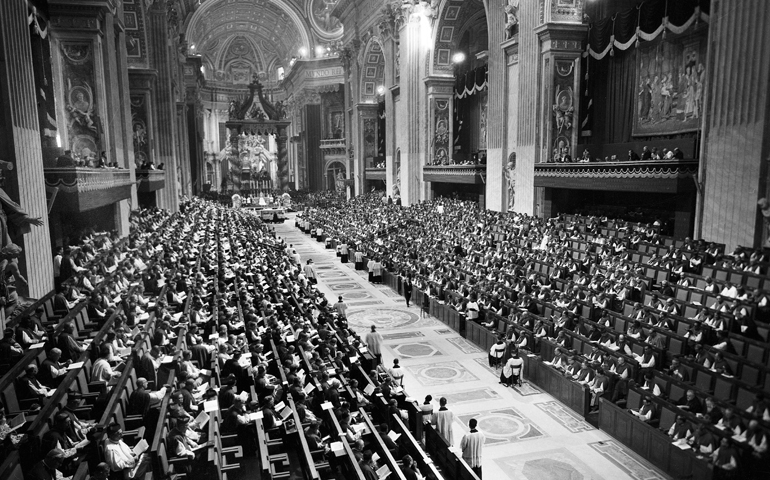
The more Catholics familiarize themselves with the Second Vatican Council, the likelier it is they will see it not only as a revolutionary event but also as a diabolical one.
To suggest that an Ecumenical Council was inspired by the devil will be viewed by many as an expression of heresy. “Vatican II was an opening of the Church to the Holy Spirit,” some will surely say. “Who are you to suggest that the Cardinals God gave us are leading souls to hell? You are acting like a Protestant and a schismatic! The magisterium is infallible.”
In an effort to illuminate the minds of those who have been spoon-fed the history of Vatican Council II, I wish to present several quotes from the Council Fathers themselves. They will help us understand the motives of the men who deemed it necessary to “update” the Church by reconciling it with the modern world. All but one of these remarks is taken from the 1963 book Twelve Council Fathers.
As you’re scanning these over, have in the back of your mind 2 Thessalonians 2:15: “Therefore, brethren, stand fast; and hold the traditions which you have learned, whether by word, or by our epistle.” Ask yourself: Are these princes of the Church holding fast to the traditions handed down to them? Or do they seem more concerned with human respect and intent on relying on their own novel ideas?
Cardinal Paul-Émile Léger, Archbishop of Montreal:
I am delighted that Catholic priests and Protestant clergymen meet more often now to engage in fraternal dialogue. p.3
We had to do something to break down the barriers that separate the various Christian confessions. The presence of the delegate-observors…was an inspiration for us…Their presence reminded us to be sure we rid ourselves of historical and psychological prejudices. p.20
If we do not take steps to do more about achieving rapprochement between the Church and the modern world, we are in danger of finding ourselves considered unrealistic and irrelevant. p.48
Cardinal Richard Cushing, Archbishop of Boston:
Protestant clergymen and Orthodox leaders have been engaged in serious theological conversations with priests in my archdiocese….Our understanding them better reduces friction to a minimum. We keep our convictions, but we get rid of the prejudices which make the idea of Christian unity impossible. p.153
I was so impressed by the fervor of the Protestant ecumenical group known as the Brothers of Taize that I approved establishment of one of their centers here in my archdiocese. p.153
We are not trying to make converts. We are not yet at the state of discussing practical means of union. We are just trying to understand each other…we are not attacking the assertions of other faiths…The unity willed by Christ and sought by the Church is not an absorption, not a Latinization, not a diminution. p.154
Cardinal Franz König, Archbishop of Vienna:
Whatever may have been the thinking of Church authorities in the past on the subject, we have entered into a new era now. In the past, relations between the Church and State…were largely the product of the local situations. In our era, we can and should work out a mode of operation that corresponds to the realities of the times. These are days of separation of Church and State….Our relationships with people around us of other religious beliefs must certainly express a spirit of tolerance…We have emerged into a period of clearer understanding about freedom of conscience. p.67-68
A common translation of the Bible could give the ecumenical movement a great psychological boost. p.69
Cardinal Achille Liénart, Bishop of Lille, France:
It was important from an ecumenical point of view…that the Council should define something about the collegiality of bishops, as well as from the bishops’ own point of view, because the role and powers of bishops meant so much to the Orthodox. p.46
Bishop G. Emmett Carter, Bishop of London, Ontario:
The big objection about the document De Ecclesia was that it presented to the world a juridical notion of the Church….Why exacerbate other believers in Christ by insisting upon their removal from us? Why not try and to find ground in which we could share a common identity and…to some form of common brotherhood? p.115
Cardinal Albert Meyer, Archbishop of Chicago:
Dignitatis Humanae is very necessary, and men of our time expect this declaration. Let us demonstrate what is essential is a free and sincere conscience. The schema will make ecumenical dialogue possible. We must take our stand on this platform of the rights of the human person. Without this declaration, our separated brethren would doubt our sincerity, and with good reason. Without this declaration, whatever else the Council might say would not be accepted by the world. “The Pope, the Council, and the Mass: Answers to Questions the Traditionalists Have Asked,” Revised Edition 3rd Edition, p.30
